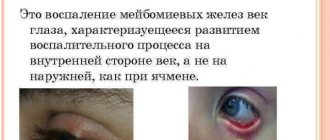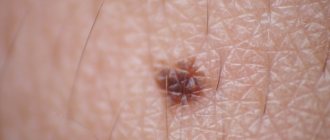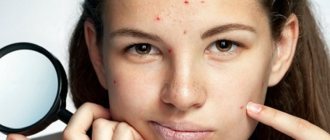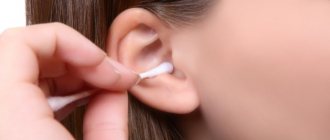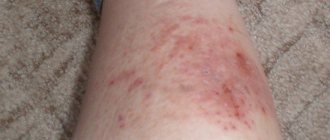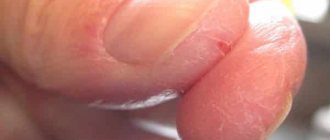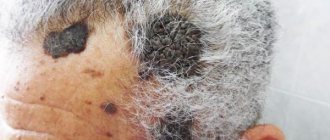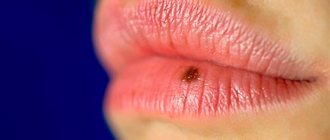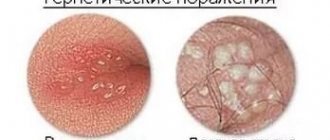Itching in an intimate place bothers many people from time to time. This is a rather unpleasant symptom that causes severe discomfort and reduces the overall quality of life. Why does the pubic area itch? There are many reasons for this.
To understand what caused the itching and why the pubis itches, it is advisable to contact a specialist who will conduct a diagnosis and be able to prescribe effective treatment . Itching in the intimate area is often a signal of the appearance and development of serious pathologies. For this reason, this problem cannot be ignored!
Diseases that cause itching on the pubis
If a rash appears on your pubic area and it itches, you should consult a doctor to confirm or rule out the following pathologies:
- Pubic lice . Lice in an intimate area can appear as a result of sexual contact with a partner suffering from lice pubis. Infection can occur through household means using intimate hygiene items and wearing the patient's underwear. Once on the pubic hair, the parasites begin to actively multiply, and the person complains of severe itching in the pubic area. Visually, irritation, hyperemia and pimples are detected on the pubis, which are very itchy.
- Scabies is a disease caused by the scabies mite. Infection occurs through household contact and through objects that the patient has come into contact with. Skin itching worsens at night. With scabies, a pimple or red spot appears that itches, as a result of which the pubis becomes red from constant scratching.
- Genital herpetic infection , the incubation period of which is two days. Herpes is a sexually transmitted disease and can appear as a watery rash after sex with someone who is infected. If you have a cold caused by the herpes virus, not only the lips, but also the pubis, which are very itchy, are affected by vesicular pimples. After opening the formations, ulcers form and the affected area hurts. With reduced immunity, stress, frequent colds, and during pregnancy, relapses of the disease are observed.
- With a decrease in immune defense, purulent rashes (streptoderma) may appear on the skin which can cause itching.
- Molluscum contagiosum . The disease is transmitted when the rash comes into contact with the skin of a healthy person. Acne is caused by irregular hygiene and hormonal imbalance. Patients note that a watery rash appears on the pubis in the form of a white rash, which does not hurt, but itches very much. When the formation is opened, a mushy white mass is released, which, if it gets on healthy areas of the skin, can infect them.
- Psoriasis is a skin disease that affects almost all areas of the skin. With psoriasis, red spots may appear on the pubic area, which are very itchy and the skin peels. The disease is severe and difficult to treat. Therapy for the disease is complex: the use of medications, physiotherapy, and the use of traditional methods. Exacerbation of the disease is replaced by periods of remission and vice versa.
- Sexually transmitted diseases that can cause itching in the groin and pubic area - chlamydial infection, syphilis, gonococcal, ureaplasma and trichomonas infections. Often their occurrence is associated with the lack of a permanent sexual partner and promiscuous sexual relations.
- Inguinal diaper rash is characterized by skin irritation and swelling. Eliminate the problem before ulcers, cracks and inflamed elements appear; eliminating diaper rash is not difficult. To eliminate the problem, it is enough to use Bepanten ointment or baby powder. If after 72 hours there is no effect from the use of the products, or if complications occur, you should immediately see a dermatologist.
- Pityriasis versicolor (as a rule, does not cause itching), and inguinal athlete's foot and candidiasis of the skin folds are diseases caused by an opportunistic microorganism - a fungus of the genus candida. Under certain conditions, the fungus becomes active, causing the following unpleasant symptoms. Itching of the skin in the pubic and genital area, the appearance of a white cheesy coating and cracks on the skin.
Fungal infections are not dangerous diseases. But they cause many problems to their owner and are difficult to treat.
Therefore, it is necessary to undergo treatment only under the supervision of a doctor, and in no case, without resorting to self-medication. Pathologies such as viral hepatitis, damage to the pancreas, blood diseases, and neuropsychiatric diseases can provoke itchy skin. The symptom can also occur with HIV infection or renal pathology.
Genital herpes
One reason is genital herpes. This disease is transmitted sexually. Small, watery pimples form in the pubic area, causing itching and burning. Then they burst and ulcers form in their place. With timely treatment they heal, but slowly. Genital herpes can even be contracted from a partner who has cold sores on the lips. Relapse of the disease can be triggered by stress, hypothermia, pregnancy or exacerbation of chronic pathologies.
Which doctor treats when the pubis itches?
Itching in the genital area can be caused by various reasons. It is impossible to say for sure which specialty doctor will diagnose and treat the disease. It all depends on what the main symptoms of the disease are. If the patient finds it difficult to choose the right specialist on his own, then you can make an appointment with a therapist. The doctor may prescribe treatment himself or refer you to a specialized specialist: dermatovenerologist, gynecologist, infectious disease specialist, parasitologist, etc.
Intertrigo
Initially, intertrigo may develop from dermatitis. Intertrigo is characterized by the appearance of a red rash on moist parts of the body, such as skin folds, armpits, and the groin area.
Humidity and heat near the intimate area can lead to overly active development of bacteria and fungi. The intertrigo rash may be dark in color, smell unpleasant, and be accompanied by severe itching.
Treatment
Over-the-counter antibacterial creams can reduce excess bacteria that cause problems. Similar antifungal agents can reduce the development of fungi.
Itchy pubis: diagnosis
Before treating genital itching, the doctor will conduct an examination and decide what tests need to be taken.
Depending on the possible causes, the doctor will prescribe:
- If you suspect scabies, you will need to take a scraping. To do this, scrape off the top layer of the skin affected by rashes, scabies mites, and papules.
- For genital infections, vaginal and urethral discharge are examined. For diagnosis, various methods are used aimed at identifying the pathogen and determining its sensitivity to the effects of drugs.
- In the case of candidiasis, smears for candida are examined bacterioscopically and using PCR.
- If the pathology is provoked by intimate hygiene products, then allergy tests are performed.
- If herpes is suspected, a smear is taken from the surface of the resulting wound after opening the vesicle, and for treponema pallidum, a smear is taken from the surface of the chancre.
Epilation in the groin area
Itching may appear after depilation performed incorrectly (or performed with non-sterile instruments). There is another reason. During depilation, some hairs are not completely removed. They begin to grow into the skin again, but do not come out. In such places, redness, peeling, irritation and follicles appear. The skin begins to itch very much. Any touch to the follicles causes pain.
In this case, it is recommended to lubricate the irritated skin with antiseptics and wear only cotton underwear. To prevent possible itching after depilation, a special steaming compress is made before the procedure. You can simply temporarily apply a washcloth soaked in warm water to the intimate area. Hold it for a short time. For shaving, the area is treated with gel. The blade should move in the direction of hair growth. Machines should be changed as often as possible or disposable ones should be used.
Treatment for itchy pubis
Treatment methods depend on the reason for the itching of the pubis. The cause of the pathology must be determined by a doctor.
During the period of therapy, you should adhere to certain rules of behavior:
- exclude sexual contacts;
- get rid of bad addictions (drinking alcohol, smoking, taking drugs);
- switch to a healthy diet;
- Regardless of the diagnosis, it is necessary to follow the rules of intimate hygiene.
With an integrated approach, you can quickly get rid of discomfort in the intimate area and prevent further relapses of the disease.
Depending on the identified infection, the doctor may prescribe the following medications:
1. For genital herpes, antiviral therapy is used (Pharmciclovir, Acyclovir).
2. Treatment of chlamydial infection is carried out with antibacterial drugs. The medications and dosage regimen are selected by the doctor individually for each patient. Therapy is supplemented with probiotics to eliminate the manifestations of dysbiosis. If necessary, local treatment is carried out.
3. For ureaplasma infection, antibacterial therapy is prescribed. What antibiotics are considered effective? Bacteria are highly sensitive to Ciprofloxacin, Azithromycin, Doxycycline and other drugs.
4. When affected by mycoses, antifungal and antihistamine drugs are used.
5. If pubic lice are detected, use antiparasitic ointments (Lindane, Crotamiton). To combat parasites more effectively, it is recommended:
- strictly follow the instructions for using the ointment;
- Before anointing the skin, you must shave your pubic hair;
- wear only clean underwear that has been ironed with a hot iron;
- carrying out antiparasitic treatment of personal items, including bedding, upholstered furniture, and carpets.
What to do if you have an allergy in the pubic area
Among the reasons why the skin in the intimate area in women itches is often an allergic skin reaction. Occurs due to hygiene products, chlorinated water and cosmetic procedures (hair shaving).
In some cases, itching may also occur during menstruation.
- In the absence of medical pathology, an important role in treatment is given to compliance with the rules of personal hygiene.
- If epilation is one of the causes of itching and irritation of the skin, then after hair removal it is necessary to use soothing creams and lotions that will relieve skin irritation. The medications Chlorhexidine and Miramistin have a good effect.
Local treatment for pubic itching
If you experience itching in the genital area, you should not deal with the problem without consulting your doctor.
In the absence of serious pathology, doctors recommend using the following remedies to relieve unpleasant symptoms:
- 5% tincture of iodine in the presence of small pustules for the purpose of cauterizing them;
- aloe leaves to reduce itching. A leaf cut lengthwise is applied to the irritated area with the pulp side and fixed with a band-aid. In this state, the leaf is left overnight;
- Levomekol and Vishnevsky ointment can be used in the form of applications to the pubic area;
- carry out treatment with a 3% solution of hydrogen peroxide for the purpose of disinfection.
There is no need to use all the means in a row. It is enough to choose one that will make you feel better.
Features of treatment of itching with thrush
Candidiasis of the genital organs has a protracted course. In pathology, there is always itching of the external genitalia.
- Features of the treatment of the disease are that, along with specific therapy, a special diet is prescribed. Alcoholic drinks and smoking are excluded.
- When treating with hormones, the possibility of canceling them or reducing the dosage is considered, as they can aggravate the course of candidiasis.
Prevention
Mild irritation in the pubic hair area can mostly be prevented with the following steps.
Avoid scratching the skin
When people scratch itchy areas of the body with their fingernails, they usually experience a short-term relief of the itching. However, nails can damage the integrity of the skin and thus aggravate symptoms.
Scratching also increases the risk of developing other problems, such as bacterial infections.
Maintain hygiene
Regularly washing the groin area helps prevent the buildup of germs that cause irritation.
Keep the affected area of the body dry after washing if possible.
To prevent the development of moisture, it is necessary to wear loose clothing made from natural materials, and also dry thoroughly with a towel after taking a bath, shower or swimming.
You should not spend a lot of time in wet clothing, such as a swimsuit, swimming trunks or training suit.
Avoid allergens
By switching to hypoallergenic products, such as appropriate cleansers, soaps and lotions, you can reduce your body's exposure to allergens and avoid skin irritation in the pubic hair area.
Physiological causes of itching of the pubic skin in women
If we exclude all pathological symptoms, then we can identify 8 causes of severe itching on the pubic area in women:
- Allergy is a common cause of many diseases; it can manifest itself suddenly, even if there were no problems before. Itching is caused by various fragrances, additives in intimate hygiene products or shower gels; also, in case of inflammation, you should avoid synthetic underwear and thongs. All of the above agents react with opportunistic flora, causing itching and irritation.
- It's no secret that hair removal injures the skin. The reaction can occur not only to the products (most often wax), but also to the hair removal itself. Often, when they begin to grow, unpleasant sensations appear, especially if the hair grows ingrown. In this case, it is better to consider an alternative hair removal method, such as laser.
- Dysbacteriosis can also be a cause of itching, only the imbalance here is considered between lactobacilli and the previously known opportunistic flora, which so often gives a signal for the appearance of irritation. This problem develops due to a completed course of antibiotics or gastrointestinal diseases, and discharge is usually noticed.
- Most often, pregnant women complain of itching, which is due to changes in hormonal levels and the vaginal environment, which becomes alkaline. An alkaline environment is ideal for awakening fungal viruses and bacteria, which make themselves felt in the form of severe itching. Such symptoms appear to a greater extent at the beginning of pregnancy, when immunity drops and the body is actively restructuring, and at the end, when estrogen is released many times more and prenatal changes occur. Usually in this case it is advised to take baths with soda, but you need to consult your doctor in advance.
- If we are talking about itching in young girls, then usually the whole reason lies in insufficient hygiene, incorrectly selected underwear and the occurrence of fungi. Experts also say that excess sweets can cause the appearance of fungi and pinworms in the groin area.
- When a woman's body prepares for menstruation, discharge and itching may occur. This occurs due to irritation of the mucous membrane during hormonal changes.
- One of the rarest but possible cases is a reaction to sperm. The fact is that the composition of sperm itself can cause dermatitis on the labia, this indicates incompatibility of the microflora, so sexual contact with this partner will be accompanied by subsequent irritation.
It is impossible not to mention personal hygiene. When a woman wears underwear for 2 days, does not wash herself for more than a day and does not follow the usual hygiene rules, the result is an unpleasant odor, itching, and sometimes discharge.
Traditional methods
Itching at home can, if not be cured, then be significantly weakened with the help of folk recipes. To eliminate itching, iodine lotions are used, which dry and disinfect the affected areas well. Aloe leaves help a lot. They are cut in half and then applied to the pimples. Then they are fixed with a bandage and left overnight.
Among medications, Vishnevsky and Levomekol ointments are used. The pubic area can be treated with hydrogen peroxide. Wash with decoctions of celandine, calendula or medicinal chamomile. If necessary, douche.
